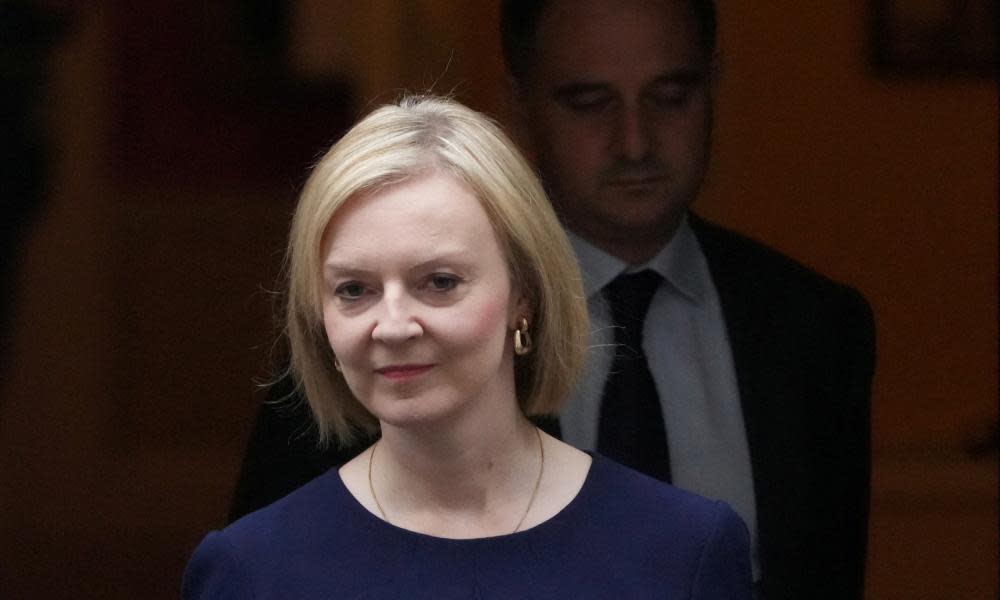A global problem? Liz Truss’s claims on financial chaos fact-checked

After days of silence, Liz Truss has finally faced questions on the UK financial market turmoil triggered by the government’s plans for sweeping tax cuts.
The prime minister agreed to a series of interviews with local BBC radio stations on Thursday, while Chris Philp, Kwasi Kwarteng’s number two at the Treasury, also answered questions on BBC radio.
The chancellor is yet to answer questions this week, despite the Bank of England being forced to make a massive £65bn intervention in markets on Wednesday morning to prevent a liquidity squeeze on pension funds.
But some of the claims in those interviews have raised eyebrows as they insisted government measures were not to blame for the turbulence. Here we check the facts.
The mini-budget was not a big surprise
The claim
Liz Truss said: “No, it isn’t [wrong policy] because... the majority of the package we announced on Friday was the support on energy for individuals and businesses and I think that was absolutely the right thing to do.”
The verdict
It is true the energy price guarantee was the majority of the plan announced on Friday. However, that only holds if the costs are assessed over the next two years: the total costs of permanent unfunded tax cuts would be much higher over the years. Policy decisions announced at the mini-budget will cost a net £161bn by the 2026-27 fiscal year, according to the Treasury.
But Truss’s statement is also potentially misleading in a more fundamental way: the energy support for households was first announced on 8 September, and Truss pledged “equivalent support” for businesses on the same day. Financial markets have had weeks to anticipate the costs (and many economists had come to the conclusion that borrowing to support energy bills would be cheaper than letting the economy crash).
It was the unfunded tax cuts that investors and economists cited as the major news in Friday’s announcement – and the cause for the surge in the UK government’s borrowing costs.
The Bank’s intervention has sorted out the problem
The claim
Chris Philp, the chief secretary to the Treasury, said: “When the Bank of England yesterday saw a very particular and specific issue with long-dated gilts and the way they interacted with certain pension vehicles, exercising and using their independent powers they intervened to sort that out.”
The verdict
Philp is correct that the Bank needed to act because of technical problems faced by pension funds. As the interest rates on gilts – or government bonds – soared, the pension funds were forced to dump the same gilts to cover calls for collateral required under complex derivative contracts. That pushed down prices and pushed up gilt interest rates further (price and yield move inversely), exacerbating a problem and threatening a spiral out of control.
However, Philp’s statement ignores a very important factor: interest rates jumped in the first place because of the tax cuts. On the day of Kwarteng’s speech, the rates on longer-term bonds jumped markedly, up from 3.77% when the market opened to a high of 4.08% – already a big move in bond market terms. After Kwarteng doubled down on the tax cuts over the weekend, the 30-year rate soared to above 5% before the Bank intervened.
There is another caveat with Philp’s statement that may make for queasy reading: it will not be clear for several weeks whether the Bank of England has indeed “sorted out” the problems.
The UK market turmoil is part of a global problem
The claim
Truss said: “People are going to pay less national insurance, but we are in difficult economic times. I don’t deny this. This is a global problem.”
The verdict
The energy crisis prompted by Russia’s invasion of Ukraine is indeed a problem across the global energy system, and governments across the world are having to come up with big, expensive support packages to satisfy voters whose costs are rising. The dollar has risen sharply against most major currencies as investors flee to the safety of the world’s reserve currency and as the US Federal Reserve raises interest rates sharply.
Yet other countries are not facing quite the same level of financial market turmoil. Investors gauge the riskiness of a country’s bonds by comparing the spread (the difference) between bond interest rates for debt of a similar maturity. Greek and Italian bond interest rates have risen in recent weeks, but the UK this week surged past them on some maturities. If the world economy has caught a cold, then the UK is suffering more than others. And there is no doubt the sell-off of the pound and rising bond yields accelerated in direct response to the unfunded tax giveaways announced by the chancellor on Friday last week.
The Bank’s intervention wasn’t unusual
The claim
Philp said: “The Bank of England, acting independently, intervened and got that sorted out, as the Bank of Japan did in the yen-dollar currency market a few days ago.”
The verdict
Philp repeatedly insisted that the Bank of England’s intervention was not that unusual, citing another wealthy society facing the prospect of slow growth and an ageing population: Japan. However, the Bank of Japan intervention was aimed at supporting its currency for reasons that were arguably political, rather than trying to prevent a full-on risk to financial stability.
The defence could also flounder for another reason: cerebral disputes about central bank interventions are not likely to distract voters for long if their monthly mortgage payments soar.

 Yahoo News
Yahoo News 
